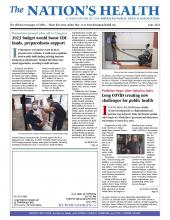
Auto emissions contribute to air pollution in New Delhi, India, which has the worst air quality of any capital city in the world, according to a global report released in March.
Photo by Travel Wild, courtesy iStockphoto
No countries and few capital cities met the World Health Organization’s standard for fine particle air pollution in 2021, a recent report finds.
Released in March by IQAir, a Swiss-based air quality company, the report said Asian and African nations were most affected by air pollution.
The “2021 World Air Quality Report” was based on air pollution data from ground-based air quality monitoring stations in over 6,400 cities in 117 countries, regions and territories. Compared to high-income nations, low-income countries had fewer sensors monitoring air quality, creating an information gap.
“Expanding awareness of, and access to, air quality information is an important action in the fight against air pollution and its harmful health consequences,” the report said. “Once people know where to find timely local air quality information, there is a much better chance they will become clean air advocates.”
In addition to country-specific analysis, the report found that only 3.4% of cities surveyed met WHO’s air pollution standard. Only four out of nearly 1,900 Asian cities met WHO’s guidelines for fine particulate matter, putting residents at elevated risk for health problems.
New Delhi, India, was found to have the worst air quality of any global capital city, followed by Dhaka, Bangladesh; N’Djamena, Chad; Dushanbe, Tajikistan; and Muscat, Oman. Capital cities that scored high on air quality included Canberra, Australia; Nassau, Bahamas; San Juan, Puerto Rico; and Stockholm, Sweden.
“Breathing clean air should be a basic human right, not a privilege,” said Greenpeace India Campaign manager Avinash Chanchal in a news release. “Addressing the air pollution crisis requires the development of renewable energy resources and clean-powered, accessible public transport. Also, solutions to air pollution are also solutions to the climate crisis.”
Air pollution is associated with lung diseases and respiratory conditions such as asthma, according to the Centers for Disease Control and Prevention, which projects that the conditions will become more common as climate change leads to dirtier air and takes a toll on vulnerable populations.
To combat the rise in air pollution, the authors recommended that governments pass new laws to incentivize electric vehicles, invest in renewable energy, enforce emission limits and develop new strategies to limit wildfires. Residents also have a role to play.
“Support local and national initiatives, propositions, measures, organizations and politicians who advocate for better air quality,” authors said. “Contact elected representatives to voice support for and encourage air quality issue advocacy.”
For more, visit www.iqair.com.
- Copyright The Nation’s Health, American Public Health Association









